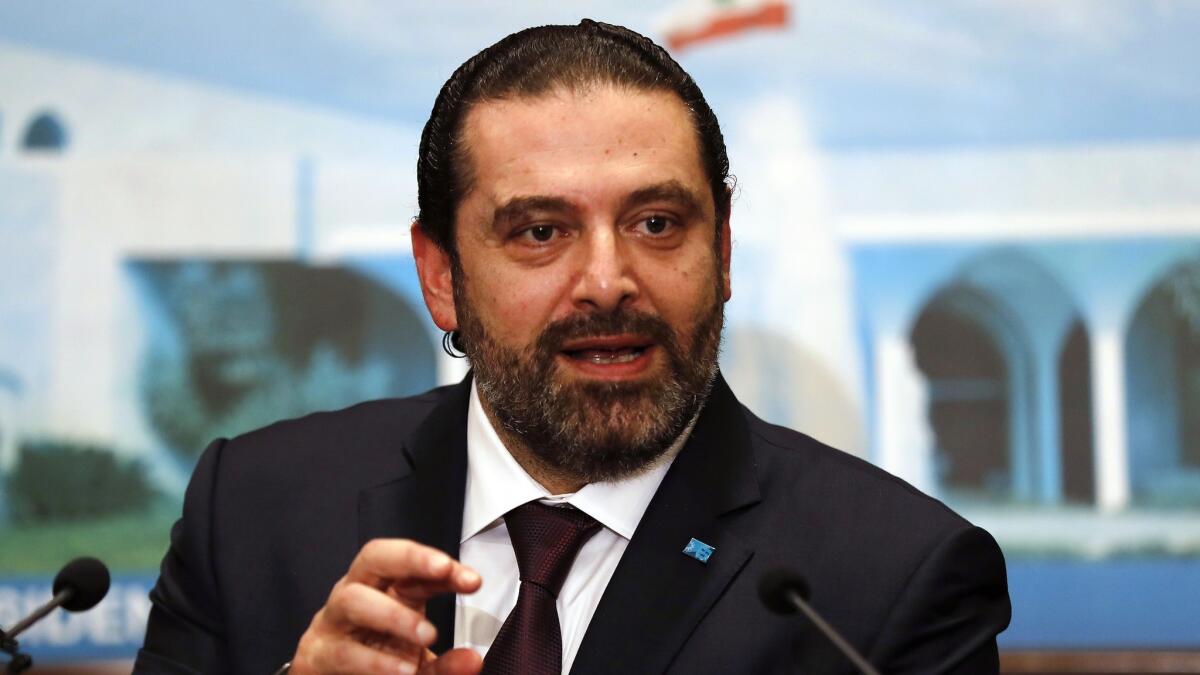Lebanon forms new government after 9-month stalemate, turns to floundering economy

- Share via
Reporting from Beirut, Lebanon — Lebanese political factions agreed Thursday on the formation of a new government, breaking a nine-month deadlock that served to deepen the country’s economic woes.
Rival political groups had been locked in disagreement over the makeup of a new government since May, after the country’s first parliamentary elections in nine years.
The breakthrough came after rival factions worked out a compromise allowing representation of Sunni lawmakers backed by the powerful Shiite group Hezbollah.
Hezbollah set to become a dominant force in Lebanon’s parliament »
Celebrations broke out after the announcement, including fireworks that lighted up the Beirut sky.
The government will be led by Saad Hariri, the Sunni politician who headed the outgoing government since 2016. The post always goes to a Sunni politician under the country’s political system.
The new government also saw an increase in the number of ministries affiliated with the Shiite Hezbollah group. Hezbollah is under tightening sanctions from the United States, which labels the group a terrorist organization. The group made significant gains in last year’s parliamentary elections while Hariri’s bloc lost a third of its seats.
The group now holds two ministries and a ministry of state, including for the first time the Ministry of Health, which has one of the country’s largest budgets. The Finance Ministry remains in the hands of a Hezbollah ally, Ali Hassan Khalil.
For the first time, the Lebanese government includes four female ministers, doubling their representation, among them the leader of the powerful Ministry of Interior, in charge of internal security. Gebran Bassil, the son-in-law of the Lebanese president, remains foreign minister.
Hariri called the new government “a reflection of Lebanon’s image in 2019.”
The main pressure appeared to be Lebanon’s deepening economic woes, and Hariri told reporters the economy would be priority.
“There isn’t any more time to waste,” he said.
But Hariri dodged a question about a contentious issue: relations with Syria. Lebanese factions have been divided over the war in neighboring Syria. Hezbollah has thrown its weight behind the Syrian government in the civil war that broke out in 2011, while Hariri and his political allies were critical, supporting at times the opposition.
The country is dealing with soaring public debt of $84 billion, or 155% of the gross domestic product, and unemployment believed to be around 36%. Lebanon’s infrastructure is also reeling under the weight of a growing number of Syrian refugees, who are estimated at more than 1 million in the country of just over 4 million.
For displaced Syrians, an offer to return home presents agonizing choices »
Labor unions and government employees have held limited strikes, and protests had picked up in recent weeks, with complaints about the politicians’ delay in forming a government and approving a budget as the economy suffered.
In keeping with a favorite practice, Hariri posed for a selfie with reporters and staff in the presidential palace after he spoke.
The first meeting for the new Cabinet will be Saturday, Lebanese media reported.
More to Read
Sign up for Essential California
The most important California stories and recommendations in your inbox every morning.
You may occasionally receive promotional content from the Los Angeles Times.













